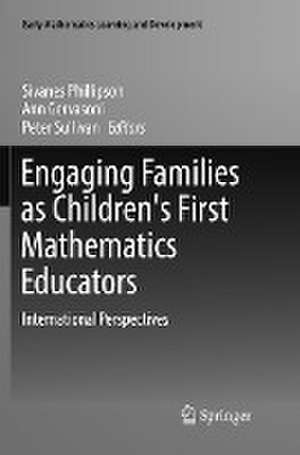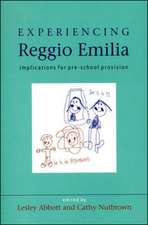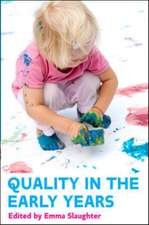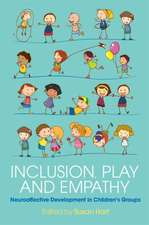Engaging Families as Children's First Mathematics Educators: International Perspectives: Early Mathematics Learning and Development
Editat de Sivanes Phillipson, Ann Gervasoni, Peter Sullivanen Limba Engleză Paperback – 5 iul 2018
| Toate formatele și edițiile | Preț | Express |
|---|---|---|
| Paperback (1) | 639.25 lei 6-8 săpt. | |
| Springer Nature Singapore – 5 iul 2018 | 639.25 lei 6-8 săpt. | |
| Hardback (1) | 645.47 lei 6-8 săpt. | |
| Springer Nature Singapore – 5 dec 2016 | 645.47 lei 6-8 săpt. |
Preț: 639.25 lei
Preț vechi: 752.06 lei
-15% Nou
Puncte Express: 959
Preț estimativ în valută:
122.34€ • 127.25$ • 100.100£
122.34€ • 127.25$ • 100.100£
Carte tipărită la comandă
Livrare economică 12-26 aprilie
Preluare comenzi: 021 569.72.76
Specificații
ISBN-13: 9789811096488
ISBN-10: 9811096481
Ilustrații: VIII, 261 p. 26 illus.
Dimensiuni: 155 x 235 mm
Greutate: 0.39 kg
Ediția:Softcover reprint of the original 1st ed. 2017
Editura: Springer Nature Singapore
Colecția Springer
Seria Early Mathematics Learning and Development
Locul publicării:Singapore, Singapore
ISBN-10: 9811096481
Ilustrații: VIII, 261 p. 26 illus.
Dimensiuni: 155 x 235 mm
Greutate: 0.39 kg
Ediția:Softcover reprint of the original 1st ed. 2017
Editura: Springer Nature Singapore
Colecția Springer
Seria Early Mathematics Learning and Development
Locul publicării:Singapore, Singapore
Cuprins
Introduction.- Chapter 1 Engaging families as the first mathematics educators of children.- Key foci and pedagogical actions that support young children's mathematics learning.- Chapter 2 Describing the mathematical intentions of early learning childhood experiences.- Chapter 3 Mathematics with infants and toddlers.- Chapter 4 Enumeration: Counting difficulties are not always related to numbers.- Chapter 5 Discerning and supporting the development of mathematical fundamentals in early years.- Chapter 6 Number stories.- Home interactions and learning experiences that support early mathematical learning.- Chapter 7 Meta-Analysis of the relationship between Home and Family experiences and Young children's early numeracy learning.- Chapter 8 Parental perceptions of access to capitals and early mathematical learning: Some early insights from Numeracy@Home project.- Chapter 9 Involving parents in games and picture books.- Chapter 10 Do Hong Kong parents engage in learning activities conducive to preschool children's mathematics development?.- Family and educator partnerships that support early mathematical learning.- Chapter 11 Working with parents to promote preschool children's numeracy: Teachers' attitudes and beliefs.- Chapter 12 Bringing families and preschool educators together to support young children's learning through noticing, exploring and talking about Mathematics.- Chapter 13 Supporting early mathematics learning: Building mathematical capital through participating in early years swimming.- Chapter 14 Fostering children's everyday mathematical knowledge through caregiver participation in Support Playgroups in Schools.- Conclusion.- Chapter 15 Insights for engaging families as the first mathematics educators of children.
Recenzii
“This book geminated from an early childhood numeracy project in Australia titled Numeracy@Home. … As a mathematics teacher educator I found this book rich in material that I can use to inform my pre-service teachers’ appreciation of the earliest mathematical experiences of the children they will teach. … the volume should be of interest to mathematics teacher educators. … The book contains many activities and references to common materials and games that can be effortlessly incorporated into daily family activities.” (Katherine Safford-Ramus, MAA Reviews, October, 2017)
Notă biografică
Sivanes Phillipson is Associate Professor of Family Studies at the Faculty of Education, Monash University. Sivanes has diverse international experience and knowledge base in the broad field of measurements and systems approaches to families and education, with expertise in large data set analysis and modeling. Her current projects include an Australian Research Council funded project on numeracy learning at home and a nation wide survey on family perspectives around educational resources.
Ann Gervasoni is Associate Professor of Numeracy at the Faculty of Education, Monash University in Melbourne. Ann has worked in educational research, teacher education, professional learning and primary teaching for 35 years. She was a member of the research team for the Australian Early Numeracy Research Project (1999-2001) in Victoria, and research director for the Bridging the Numeracy Gap project in Western Australia and Victoria (2009-2010). Ann’s research and scholarship focus on mathematics education in early childhood and primary education, mathematics intervention approaches for students who are mathematically at-risk, and community approaches for supporting the learning of those most vulnerable in our community.
Peter Sullivan, originally a teacher of mathematics, is currently Emeritus Professor at Monash University. He has extensive experience in research and teaching in teacher education. He was a member of the Social, Behavioural and Economic Sciences panel of the Australian Research Council College of Experts from 2005 to 2008, and was an editor of the Journal of Mathematics Teacher Education for 8 years. He is a past President of the Australian Association of Mathematics Teachers, author of the Shape Paper and lead writer of the Australian Curriculum: Mathematics.
Textul de pe ultima copertă
This book explores how professionals can engage and inspire parents to support their young children’s mathematics learning. Bringing together international experts, researchers and scholars, it proposes a framework for engaging with and supporting parents, including those who are less aware of the crucial development of children’s mathematical skills in the early years. Focusing on mathematics learning from birth to 5 years, the book’s underlying assumption is that it is possible to offer guidance to professionals working with families with young children concerning how to engage and support families in the area of mathematics learning, including those families who seem alienated from education services. Specifically, the respective chapters present a framework for understanding children’s early mathematical development and the important role of families in this regard. They describe effective strategies for engaging families in their children’s mathematics learning, including those who are marginalised and experience multiple disadvantages, so that all families can best support their children’s mathematical learning and their development of positive attitudes towards learning. In closing, hurdles and opportunities within the systems surrounding family engagement are addressed.
Caracteristici
Brings together for the first time a collection of research-informed proposals on how early-years educators can work with families to promote mathematics learning Includes specific advice on the types of interactions and activities within families that promote young children’s mathematics learning Demonstrates and underlines the importance of acknowledging families as young children’s first mathematics educators Includes supplementary material: sn.pub/extras

















